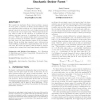Free Online Productivity Tools
i2Speak
i2Symbol
i2OCR
iTex2Img
iWeb2Print
iWeb2Shot
i2Type
iPdf2Split
iPdf2Merge
i2Bopomofo
i2Arabic
i2Style
i2Image
i2PDF
iLatex2Rtf
Sci2ools
101
click to vote
STOC
2009
ACM
2009
ACM
A constant-factor approximation for stochastic Steiner forest
We consider the stochastic Steiner forest problem: suppose we were given a collection of Steiner forest instances, and were guaranteed that a random one of these instances would appear tomorrow; moreover, the cost of edges tomorrow will be times the cost of edges today. Which edges should we buy today so that we can extend it to a solution for the instance arriving tomorrow, to minimize the expected total cost? While very general results have been developed for many problems in stochastic discrete optimization over the past years, the approximation status of the stochastic Steiner Forest problem has remained open, with previous works yielding constant-factor approximations only for special cases. We resolve the status of this problem by giving a constant-factor primal-dual based approximation algorithm. Categories and Subject Descriptors: F.2.2 [Analysis of Algorithms and Problem Complexity]: Nonnumerical Algorithms and Problems General Terms: Algorithms, Theory
Algorithms | Steiner Forest Instances | Steiner Forest Problem | STOC 2009 | Stochastic Steiner Forest |
| Added | 23 Nov 2009 |
| Updated | 23 Nov 2009 |
| Type | Conference |
| Year | 2009 |
| Where | STOC |
| Authors | Anupam Gupta, Amit Kumar |
Comments (0)

